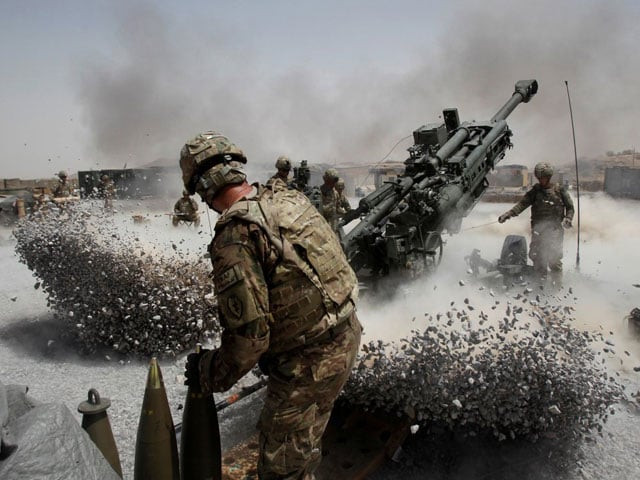Afghanistan war aim 3.0
The old guard is back in power protecting the US and Israeli interests

The old guard is back in power protecting the US and Israeli interests. PHOTO: FILE
However, after sanitising the American wish list of Indian wishes, the report makes the previous wish list look like the carrot. The report basically advocates for taking unilateral action in order to achieve the American strategic objectives, even if it means negating Pakistan’s interests. The Abbottabad raid is an example of unilateral action. We know what it did to Pakistan-US relations. The report points to multilateral action, which would be taken where the interests of both the countries converge.
Let me get this straight, the US would work with Pakistan in taking action against terror groups. At the same time, the US would go at it alone, bypassing Pakistan, violate its sovereignty if it has to, in order to go after the terror groups it suspects of having safe havens inside Pakistan. That is what Edward Norton did in the movie Italian Job where he cooperated where he needed to and went against the partners when he wished. Turns out Washington truly loves the term frenemies. By the way, Norton had a sad ending.
The US Strategic Command (STRATCOM) in Clinton era had produced an important study entitled Essentials of Post-Cold War Deterrence, which was concerned with the role of nuclear weapons after the end of the Cold War. Apart from its main conclusion that nuclear weapons must always be there, STRATCOM advised that “planners should not be too rational about determining… what the opponent values the most… It hurts to portray ourselves as too fully rational and cool-headed.... That the US may become irrational and vindictive if its vital interests are attacked should be a part of the national persona we project.” This goes back to the same mindset after the WWII ended, when Washington saw the world as a ‘Grand Area’, which was to be subordinated to the needs of the American economy or even John Quincy Adams’s Monroe Doctrine and Manifest Destiny. The report is just a Pakistan tailored incarnation of that mindset.

The Pentagon stressed that the Taliban needed to realise that there was no victory in the battlefield. “They must know that their only path to peace and political legitimacy is through a negotiated settlement with the Afghan government.” Recently, Secretary Tillerson emphasised the same, noting that the new approach was to “ensure the Taliban know, you will never win a battlefield victory and the way forward is going to be by engaging in a reconciliation process and ultimately joining a government in Afghanistan.” Interestingly, that is what the Pakistani leadership has been saying. Furthermore, what raises the eyebrows is that the US is advising the Taliban that victory isn’t in the battlefield but instead in negotiation and “joining a government in Afghanistan.” Should we call it Afghanistan war aim 3.0?
The first one was that al Qaeda was behind the 9/11 attacks and it is hiding in Afghanistan so we must attack. Then the Taliban asked for proof, miffing Bush who invaded Afghanistan for removing the government of Taliban. That was war aim 2.0. Then somewhere during the war, freeing Afghan women became the aim 2.5. Now, the US wants Taliban to return to the government. That is mind boggling because that is where the Taliban were before the 2001 invasion. That’s reminiscent of Einstein’s Theory of Relativity. Washington has proved that you can travel to the past if you travel with a certain level of belligerence, hubris and myopia.
The case of Egyptian democracy is relevant here, which came in the wake of Arab Spring. People protested in Tahrir Square bringing down Hosni Mubarak. The Muslim Brotherhood (Ikhwan) won at the ballot, making Mohammed Morsi the first elected president of Egypt. Just a little over a year into his presidency and he was removed in a military coup. There is a US law, which prohibits giving aid to any country where a military coup happens. Since aid cannot be stopped, Washington has opted not to call it a coup.
The old guard is back in power protecting the US and Israeli interests. Shipping lanes just off the coast of Port Said and on to the Suez Canal are up and running carrying oil to the US. The Ikhwan had abandoned violence and embraced the ballot. They won the election and today their leader Morsi is behind bars. Gorbachev was promised that upon reunification of East and West Germany, Nato wouldn’t move “one inch to the east,” meaning East Germany. Immediately, the Russians were reminded that the promise was just verbal and if they trusted the word of the Americans, then that was their problem. Libyans were promised to be left alone if they handed over their nukes. Where is Libya now? North Koreans learnt from that and went on to make their nukes. What makes us think the Taliban would trust the American promise?
Published in The Express Tribune, December 28th, 2017.
Like Opinion & Editorial on Facebook, follow @ETOpEd on Twitter to receive all updates on all our daily pieces.

















COMMENTS
Comments are moderated and generally will be posted if they are on-topic and not abusive.
For more information, please see our Comments FAQ